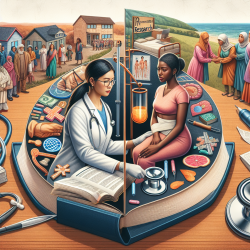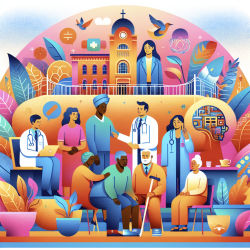Introduction
Female Genital Cutting (FGC) remains a critical issue within Western healthcare systems, particularly as they strive to provide optimal care for migrant communities. The research article "Sculptors of African Women’s Bodies: Forces Reshaping the Embodiment of Female Genital Cutting in the West" by Johnson-Agbakwu and Manin (2020) offers insights into the sociocultural and geopolitical forces that influence women's health-seeking behaviors and decision-making processes. This blog post aims to help practitioners improve their skills by implementing the research outcomes or encouraging further exploration into this complex topic.
Key Insights from the Research
The study highlights the importance of understanding the historical, sociocultural, and geopolitical contexts that shape the experiences of women affected by FGC. The Theory of Planned Behavior (TPB) is presented as a conceptual model to guide healthcare providers in engaging in culturally sensitive discussions and shared decision-making with patients, their partners, and families.
Acculturation, the process of adapting to a new cultural environment, is a significant factor in shaping attitudes and behaviors towards FGC. The research emphasizes that acculturation is not linear and is influenced by various factors, including social networks and cultural norms from the country of origin.
Practical Applications for Practitioners
Healthcare providers can enhance their practice by considering the following:
- Engage in culturally sensitive discussions by understanding the patient's cultural background and the sociocultural forces at play.
- Use the TPB model to facilitate shared decision-making, considering the patient's attitudes, perceived norms, and perceived autonomy regarding FGC-related care.
- Develop trust with FGC-affected communities through community engagement and partnerships with cultural brokers.
- Enhance clinical skills by participating in continuing education and training focused on the cultural and clinical nuances of caring for women with FGC.
Encouraging Further Research
While the research provides valuable insights, it also highlights the need for further exploration into the impact of acculturation on healthcare utilization and health outcomes among FGC-affected populations. Practitioners are encouraged to engage in research that examines:
- The role of social determinants of health in influencing distrust and health-seeking behavior.
- The impact of healthcare provider attitudes and practices on patient experiences and outcomes.
- The development of culturally sensitive interventions that address the unique needs of FGC-affected communities.
Conclusion
Understanding the complex dynamics surrounding FGC is crucial for healthcare providers seeking to improve care for affected women. By implementing the research outcomes and engaging in further research, practitioners can contribute to creating a healthcare environment that is respectful, culturally sensitive, and supportive of women's autonomy and decision-making.
To read the original research paper, please follow this link: Sculptors of African Women’s Bodies: Forces Reshaping the Embodiment of Female Genital Cutting in the West.










